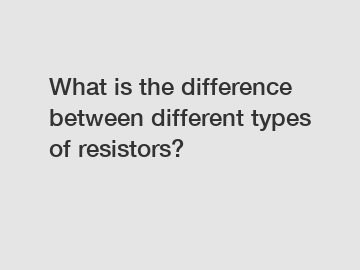Mar. 12, 2024
Electronic Components & Supplies
When it comes to electronic components, resistors are an essential part of any circuit. They are used to limit the flow of electric current in a circuit, and their value is measured in ohms. While resistors all serve the same fundamental purpose, there are different types of resistors that vary in their construction and performance characteristics. In this article, we will explore the differences between various types of resistors to help you understand which one is best suited for your specific application.
One of the most common types of resistors is the carbon film resistor. These resistors are made by coating a ceramic rod with a layer of carbon film, which has properties that help regulate the flow of current. Carbon film resistors are known for their stability and reliability, and they are ideal for applications where precision is important.
Another popular type of resistor is the metal film resistor. These resistors are made by depositing a thin film of metal, such as nickel-chromium or tin oxide, onto a ceramic substrate. Metal film resistors are known for their high precision and low noise levels, making them ideal for applications where accuracy is crucial.

One of the oldest types of resistors is the wirewound resistor. These resistors are made by winding a resistive wire, typically made of an alloy like nichrome or constantan, around a ceramic or fiberglass core. Wirewound resistors are known for their high power handling capabilities and low temperature coefficients, making them ideal for high-power applications.
For applications where space is limited, surface mount resistors are often used. These resistors are designed to be mounted directly onto the surface of a circuit board, saving valuable space and reducing the overall size of the circuit. Surface mount resistors come in a variety of styles, including thin film, thick film, and chip resistors, each offering different performance characteristics.
For applications where precision and stability are paramount, precision resistors are often used. These resistors are designed to have very tight tolerance levels, often as low as 0.01%, and low temperature coefficients to ensure accurate performance over a wide range of operating conditions. Precision resistors are commonly used in applications such as medical devices, test equipment, and military and aerospace systems.
In addition to these common types of resistors, there are also specialized resistors that are designed for specific applications. For example, variable resistors, also known as potentiometers or rheostats, allow for the adjustment of resistance levels within a circuit. This can be useful for applications where the resistance needs to be changed manually, such as in volume controls or dimmer switches.
Thermistors are another type of specialized resistor that changes resistance in response to changes in temperature. These resistors are often used in temperature sensing applications, such as thermostats or temperature control systems, where precise temperature control is essential.
Overall, the choice of resistor type will depend on the specific requirements of your application. Factors such as precision, power handling capabilities, size constraints, and temperature stability will all play a role in determining which type of resistor is best suited for your needs. By understanding the differences between various types of resistors, you can make an informed decision and ensure that your circuit performs optimally.
In conclusion, resistors are a critical component of any electronic circuit, and there are several different types to choose from depending on your specific needs. Whether you require high precision, high power handling capabilities, or temperature stability, there is a resistor type that is well-suited for your application. By considering the differences between various types of resistors, you can select the right component for your circuit and ensure its reliable and efficient operation.
For more information, please visit types of fixed resistors, all types of resistors, Xieyuan Electronic Technology Co., Ltd..
Previous: What is microcontroller in electronics?
Next: Best strategies for selecting an industrial control board?
If you are interested in sending in a Guest Blogger Submission,welcome to write for us!
All Comments ( 0 )